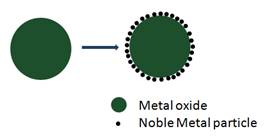|
CONTACT
EDUCATION
M. Sc. Materials Science & Engineering,
National university of Singapore
B. Sc. College of chemistry and molecular engineering,
Peking University
RESEARCH
INTEREST
Synthesis metal oxide supported noble metal nanoparticle
composite as catalyst for direct ethanol fuel cell.
Direct ethanol fuel cells (DEFCs)
are an appealing alternative to the direct methanol fuel
cells (DMFCs) due to the higher theoretical energy
density of ethanol, accessibility; renewability and lower
toxicity of the fuel. There are several significant
technical challenges in DEFC to be unravelled including
insufficient activity, poor durability and reliability and
so on. Platinum-based catalysts are most commonly used as
anode catalyst for DEFCs. In general, the Pt-based catalysts
are supported on porous conductive materials with a high
specific surface area. The most popular support material is
Vulcan XC-72 carbon black because of its excellent electric
conductivity, high surface area and pore structure. However,
in DEFC operation environment, carbon is known to be
oxidized electrochemically in aqueous solution by the
following reaction:
C + 2H2O
®
CO2 + 4H+
+ 4e- (0.207 V vs SHE, 25°C)
The carbon corrosion rate will be accelerated in the
presence of Pt which will lead to agglomeration or growth of
electrocatalyst particles and deteriorate the cell
performance.Therefore,
extensive efforts have been made to develop new catalyst
support materials, including nanostructured carbon (such as
carbon nanotubes, mesoporous carbon, carbon nanofibers and
graphene etc.), oxides, and nitrides, etc. Metal oxides are
good candidate since they have higher electrochemical
stability than that of carbon black. Such feature is a
prerequisite to produce the long-term durable catalyst.
Unfortunately, most oxides are poor conductor which limited
its use in electrochemical application. The conductivity of
the metal oxide could be improved by attaching them with
conductive materials or by doping proper element.
My research interest is to synthesize metal-oxide-noble
metal nanoparticle composite and use them as catalyst for
DEFCs. In the composite, the metal oxide not only works as a
support for noble metal nanoparticles, but also contributes
to the electrocatalytic activity.

Schematic illustration of the metal-oxide-noble metal
nanoparticle composite
| 
